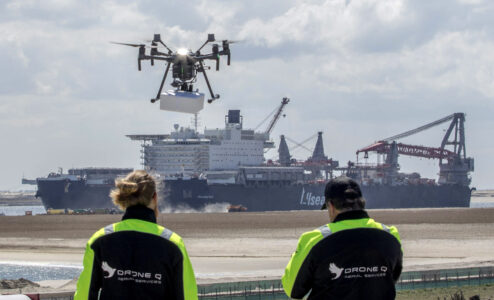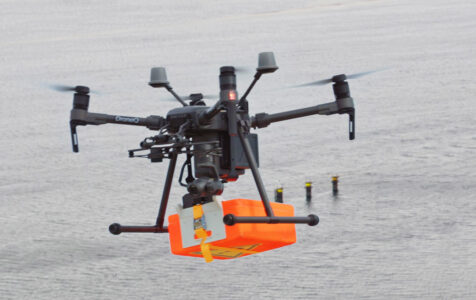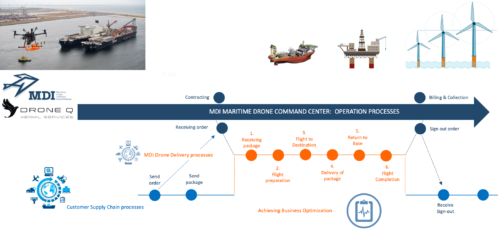Around mid-October, 2020, John Spee (North Holland North NHN Development Company) and John Troch (DroneQ Aerial Services) gave a presentation in Nieuwegein, the Netherlands, that explained the cooperation between Energy Reinvented and METIP (Maritime Emerging & Enabling Technologies Innovation Platform) and showed how drones could provide support to the Offshore Energy Industry Oil, Gas & Wind. The presentation was the start of the Maritime Logistics Drone Delivery program for offshore energy.
Safety is paramount when conducting Drone Delivery flights and requires intensive preparation. Not only the legal framework is an important part of this, but also flight safety itself. A comprehensive risk analysis for these specific circumstances is carried out. Things like the flight environment, flying over long distances beyond the drone pilot’s sight and flying over water require specific risk mitigation measures. Landing with a drone in a high-metal environment, potential disturbances by radar and high-power transmission equipment on board the ship, offshore installations and offshore wind turbines are included in the risk analysis. Permits for flying over longer distances (BVLOS=Beyond Visual Line Of Sight) require, among other things, detailed operational procedures and emergency procedures, modifications to drone and support equipment, being able to navigate and communicate with the drone over 4G, 5G or Iridium (satellite), drawing up a flight communication plan before, during and after flight.
MDI
DroneQ has developed a comprehensive development and test program within the Maritime Drone Initiative (MDI), part of METIP, with respect to Maritime Logistics: Drone Delivery, where drones are equipped with a so-called payload delivery system that allows the pilot to release the payload remotely. The package in which the cargo was transported has also been designed, tested and optimized to ensure that the cargo has as little impact as possible on the flight performance of the drones and the cargo is protected to the maximum. On-site testing is part of this process to obtain maximum assurance that safety during the operation would remain within the risk acceptance frameworks.
The conditions in maritime environments are of a different order than those above land. Issues such as strong winds, salt haze and rapidly changing weather conditions make the conditions in which maritime drones must continue to operate within the framework of acceptable risk level into a special field. This not only places high demands on the operator, but also on the equipment itself and on the operational processes and procedures.
Integration
An important element of Drone Delivery is the ability to operate within the processes and procedures of the Logistics Supply Chain, in which Drone Delivery processes need to be seamlessly integrated. Logistics is a special field in which everything has to be right in order not to run the risk of stagnation of the supply chain. Not only the supply chain process must be a well-oiled machine, processes must also be set up and regularly tested to ensure continuity of service. Especially in the dynamic world of Offshore Energy, a reliable supply chain is crucial! This requires a professional and reliable partner in this field. Drone Deliveries will include operations on land, in ports, to offshore wind turbine parks, offshore installations and ships and will focus on transporting reserve parts, tools and measuring instruments, documents, medicines and other high-value supplies by drone. The ambition is to automate as much as possible and to enable autonomous deployment, which will be introduced in phases. In addition to drones, Autonomous Surface Vessels (USVs) and underwater drones (ROVs) will also be among the focus areas.
In addition to Maritime Logistics: Drone Delivery, other disciplines using drone applications will also be highlighted, including Security, Inspection, Surveying and Maintenance.
Operation from platform
The power of METIPs MDI is to operate from a platform where a consortium of companies that are each experts in their own part of the Drone Delivery process and jointly bring in expertise, experience, knowledge and activities to take Maritime Logistics: Drone Delivery to the required level and maintain it. Innovations in areas such as communication technologies, Artificial Intelligence, automated offshore drone bases and other operational innovations set the bar even higher for these consortium partners. The process-based project approach of applying existing technology, adapting existing technology that may require a specific demand to develop a special drone for example, can be addressed from the ecosystem of METIP partners and makes the collaboration between Energy Reinvented and METIP unique. Never before has the development and application of maritime drone support for offshore energy been formed on this scale.
‘With the current technology, we can carry 6kg of cargo over long distances (6o-80km), or 20kg over short distances (16km). However, in the Maritime Logistics: Drone Delivery program we can build a drone that can transport up to 100-150kg over 60-100km.’
John Troch, Drone Q Aerial Services



